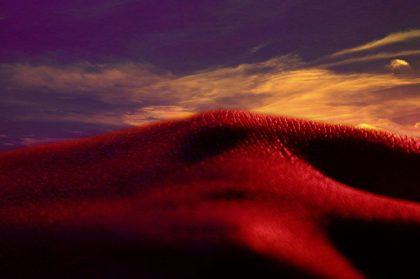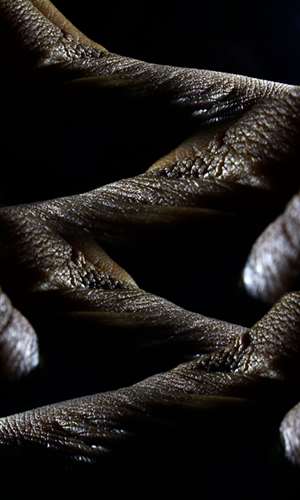
Cypress Woods High School, Cypress, TX.
This week in our series featuring the 2019 Gold Medal Portfolio recipients, we take a look at Taylor Powers, a photographer, and Brianna Kline Costa, a writer. Taylor’s photographs are like optical illusions with parts of the body standing in for landforms or abstract objects. Brianna writes about personal topics that touch on societal issues. Both received $10,000 scholarships for their portfolios.
Taylor Powers
“My body of work in this portfolio is inspired by my love for nature and my love for the anatomy of the human body. I found it hard to create landscapes on their own because they never felt original and neither did my portraits, so I decided to combine my two favorite subjects to photograph and turn it into something creative and experimental that really makes me push myself as an artist. Human Nature features photographs of the human body transformed into landscapes with skin textures and deep shadows that mimic the sun’s lighting on the earth.”

Cypress Woods High School, Cypress, TX.
Brianna Kline Costa
“My favorite part of writing is revisiting and realizing obsessions. I never go into a piece with a particular intention, but I’ll notice while writing that a particular image or word stands out to me that I use in several pieces, or a subject that I find I have a lot to say about and continue to go back to.
“I first starting making stories when I was three. My mother used to save tips to buy me construction paper and crayons, and I would draw a picture. On the back of the drawing, I would tell her the story of the picture, and she would write it down and keep it in a binder in her closet. Writing for me has always been about ambition and finding new ways to talk about frequently discussed issues. My main goal primarily is to bring visceral perspectives back to politics. Important issues can get lost in big words and politicized terms, but in the end, when discussing public policy, the most important aspect is how it affects the people, and I feel as if we have lost a lot of human empathy.”
Happy Girls
BRIANNA KLINE COSTA, Personal Essay & Memoir. Grade 12, Pittsburgh CAPA School, Pittsburgh, PA.
“Mexican, huh?” He sways, leaning on his own hallowed bones. He reeks of liquor. “Well, hola.” He laughs, his body swaying and feet stumbling across the tile floor. I am pressed into the corner of the kitchen, my fingers tracing the edge of the counter. The door to the back porch swings open. As night fell, the temperature had dropped to a disconcerting chill, and I use my hands to mask my goosebumps and the way my veins burn through my skin under fluorescent lights. He stands leaning against the kitchen wall across from me. I stare at the rusted stove burners, blushed with heat.
“Dad, stop,” my friend says, turning towards me, rolling her eyes and smiling. I smile back at her, but I know my face is tight and pale, and my smile is forced and unconvincing. She doesn’t notice though. She looks through me.
“No, no, see, here’s the thing…” His body falls into the chair behind him. “I don’t mind them in the country, as long as they know their role. That’s the important part.” He leans towards us, and I can feel his hot breath on my face. My cheeks flush in anger and embarrassment. I feel my back pressed against the wall. He drunkenly turns his bottle upside down and laughs as beer sloshed against my feet, seeping into my socks and yellowing the white. The stale smell of cheap beer. His teeth yellowed and his face carved into new-age portraits of stone gargoyles. “Why don’t you get on your knees and clean my floor, sweetheart?”
I was thirteen. It was the age when I stopped wanting to be looked at, when I started straightening my hair every day, so familiar with the sizzle of anti-frizz products as I clamped down, the air thick with the smell of burnt hair; when I started wearing cheap drugstore mascara that smudged and left dark bruises under my eyes. Started becoming conscious of how I smile (never with my teeth, until the braces were off), what angle I stood (pivoted slightly to the right to counter the appearance of hip dips), how I laughed (head back, hand over my mouth to cover my lips).
Tonight, we set up blankets on her couch and watch horror movies. Her house smells of cigarette smoke and is littered with crushed beer bottles, and the smell of weed reeks from her older brother’s room, but that was most of our homes on the North Side. Things didn’t bother us as much; men would yell at us out of the window of their car to us when we walked to the convenience store, and we would flip them off or yell things back and run away giggling when they turned the car back around. When men followed us from our bus stops, we would complain to our friends about it, rolling our eyes like the attention of boys and men was the most inconvenient part of our lives, searching out of our peripheral for any tinge of jealousy in their eyes. But deeper than that, it scared us and it left us uncomfortable in our bodies. We knew that walking down certain streets, our bodies didn’t belong to us anymore, and we were told that we liked this, even by each other.
I hear him when he stumbles through the door. The keys jangling in the lock, the doorknob twisting, turned by clumsy fingers. From the living room, we can hear him wiping off his shoes on the mat and opening the fridge for another beer. His vision getting a little more blurred and dizzy. His voice getting a little more slurred. Drinking by himself one room over, legs propped up on the table.
***
I don’t say a single word throughout the whole encounter. His face is a foot from mine, and I see how it flushes when he bends over, sweat dripping down his temples and plastering greyed curls to the sides of his head. I imagine how I look in the moment: eyes round and wide, face empty and bovine, my arms thin and freckled, legs veined and pale.
He laughs at my empty, frightened silence, then saunters out of the kitchen. We hear the front door slam, the engine of the truck rev, and the truck pull away. It is eleven thirty. I lean against the table and try to cover my shaking.
She tucks her hair—the same mousy brown as her father’s without the gray streaks—behind her ear, smiling. Staring through me, her eyes that familiar shade of amber.
***
The power is in how we see ourselves. Growing up, I saw Latina women as maids, housekeepers, and if they weren’t the help, they were overtly sexualized. Thick lipped, wide hipped, cinnamon skin, long dark hair, with snippy remarks and little moral compass. These were the images on television. In my life, I had even less inspiration. I had spent my whole childhood after the age of six living in Pittsburgh, and I didn’t know a single Latina woman. The women in my life, in a broader sense, hadn’t felt any more empowered to me. Adolescent girls seemed to be living in a dark and empty abyss of insecurity and feigned happiness. Girls who wore low cut shirts with brightly colored pushup bras, their chests looking raw and almost juvenile. Who constantly pulled the collar up whenever they felt stares. Girls who spent time with boys who scared them. Girls who giggled uncomfortably at jokes at their own expense. Girls who had tried to apply cheap eyeshadow they lifted from the corner store, sloppy and creased. Hands constantly drifting to their eyes, letting hair fall over their face as if wishing they hadn’t worn it in the first place. Mustard yellows that accentuated the sallow-ness of their skin. Bright blues that accented the dark circles under their eyes like bruises.
***
Now it’s two o’clock. A movie is playing, but I’m not sure which one. I am drifting in and out, the dialogue of the television suspended in my sleep. Thick and fragrant smoke from her brother’s room hangs in the damp air, making my head spin. My friend has fallen asleep, her head tilted to the side, a small line of drool down her chin. I wonder if she is afraid of him. Sometimes she flinches when she hears the door open. The only time a girl looks happy is when she is sleeping.
I go to the kitchen to get a glass of water.
The cabinet is filled with an assortment of cheap plastic cups, rough with scratches. The sink makes a soft clunking noise as the water runs. The bubbles set. I take a sip.
As I walk back to the living room, I feel something cool seep into my sock. It’s the puddle of beer, which has sunk into the floor and left a deep, mahogany stain. I take off the wet and stained sock, wringing it in my hands slightly. I step over the puddle and into the living room.
The volume on the TV is low and persistent. I can hear music playing from somewhere, likely her brother’s room upstairs. I see headlights flash in the windows, and my heart freezes for a moment, thinking that her dad is home, but I hear the car retreat into the dark of the street, and my beats slow. As I fold my body under a thinning, frayed blanket that smells of mildew and laundry detergent, I barely have time to think before I am pulled into a restless sleep. Four or five hours of peace and emptiness. Four or five hours that I have to look happy.
To see more Gold Medal Portfolio recipients, past and present, visit our Eyes on the Prize series.
